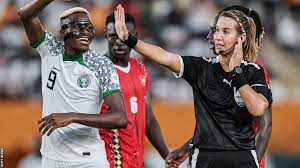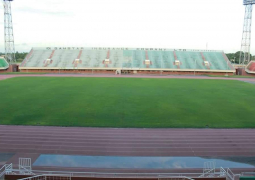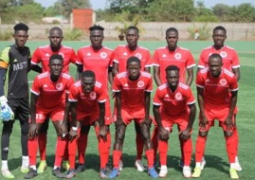
Karboubi is an international football referee and a policewoman in Meknes, a city in northern Morocco.
"Being a policewoman for me, means applying justice," she told BBC Sport Africa.
"As a referee, it's me who applies the law and it's a win-win because it's a job and it's my passion and they are linked to each other."
Karboubi is the only referee out of the six female match officials at the 2023 Africa Cup of Nations in Ivory Coast.
In 2022, Salima Mukansanga of Rwanda made history by becoming the first woman to referee a men's Afcon match in Cameroon.
Karboubi emulated that feat last month, and led an all-female team team of officials - another tournament first - when Nigeria beat Guinea-Bissau in the group stage.
The Moroccan's central role in the ongoing tournament makes her the first North African woman to referee at a men's Afcon.
"The emotions were enormous. It is an honour for me, for my family, for my country and for African women in general," she says about her participation.
The 36-year-old, however, adds there is more to her identity than her two jobs.
"It's true that at work I'm a police officer and on the field I'm a referee. But at home, I am a woman, I am the woman of the house and the mother of a daughter."
Breaking stereotypes
Growing up, Karboubi loved playing football but stopped because there was no organised women's football at the time.
So, she decided to go into match officiating where she saw more opportunities as a referee.
Karboubi faced resistance from her family in chasing her dreams, telling UN Arab Women, external in 2021: "I come from a small conservative town; therefore, it was difficult for my family to accept the fact that I wanted to pursue my career in sports."
Her brothers were her biggest hurdle.
They once found her assistant's flag and tore it up, leaving teenage Karboubi in tears but she sewed it up and went on to training.
But in 2007, her father watched her referee a women's game, and from then on she got support to follow her chosen path. Today, she is a trailblazer for Arab women on the field.
Besides being the first Arab woman to referee a men's match in 2020, Karboubi is also the first African woman to qualify as a video assistant referee (VAR).
Morocco and Egypt are the only countries in Africa that have fully implemented the use of VAR in their domestic leagues.
"I am lucky to be Moroccan because that was the first African country to introduce VAR," Karboubi explains about her introduction to video officiating.
"I was then able to officiate as an assistant video referee in the final of the 2021 men's Afcon and it was an honour for me.
"It meant that women could work in all areas like men. We have always fought to be with men. We were able to show that we could be [there]."
Karboubi's first international refereeing role was the 2018 Women's Africa Cup of Nations in Ghana.
Police inspector
Female referees across the world are making their mark on the beautiful game.
In 2022 France's Stephane Frappart became the first woman to officiate at a men's Fifa World Cup, taking charge of the group-stage game between Costa Rica and Germany
Despite these strides made so far, Karboubi feels women must still go an extra mile to prove their competence.
"It's true that women, to get to this level, they must work extra hard. First physically, because to be ready for a men's match we must be physically fit like the men," she explains
"After that the technical expertise, that we must have of course, on the rules of the game.
"If a man makes mistakes, they will say that he's a man, he's only human. But a woman will be criticized twice as much because she is a female referee."
At work back in Morocco for the police, Karboubi is an inspector and receives support from her colleagues who are always curious about her officiating duties.
"They make little remarks to me; 'Why didn't you do that? Why did you do that? Why did you whistle for a penalty? Explain to us why the red card' but they always encourage me, and I appreciate their support for me," Karboubi said.
She believes the two jobs complement each other.
"Refereeing helped me a lot as an athlete to be a good police officer, and being a police officer helped me have a strong personality on the field as a referee."
The mother of one has ambitions to officiate at the men's World Cup one day, after making her Fifa debut in the women's tournament last year.
She hopes her achievements so far in two male dominated fields can inspire young women in the Arab world and beyond that no field is off limits.
"It may have been a male dominated field, but today we have been able to show that even women are able to do it," she said.
"So, I would tell girls who have that goal to work hard and never give up."
Source: BBC





